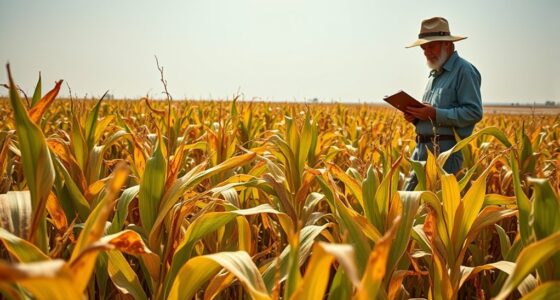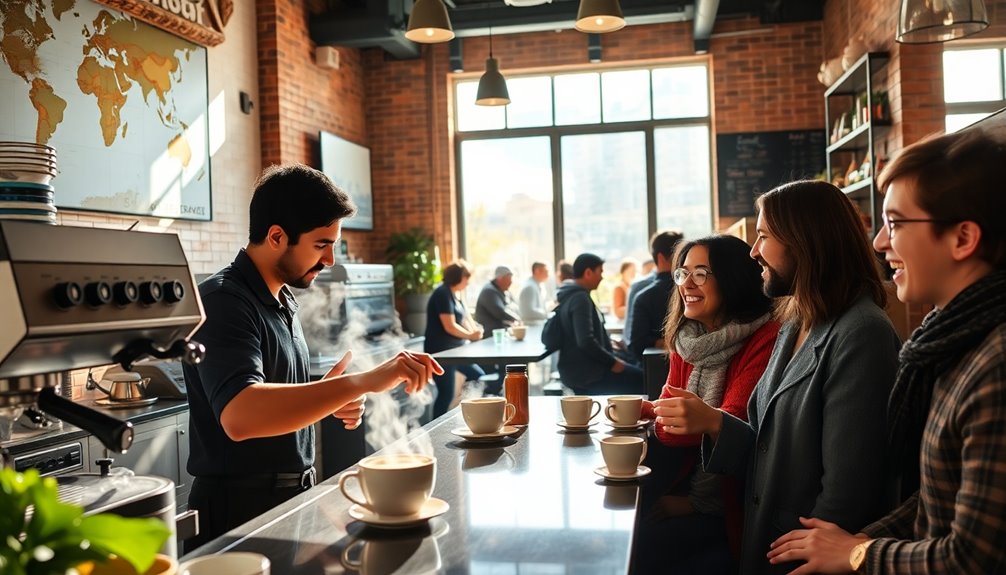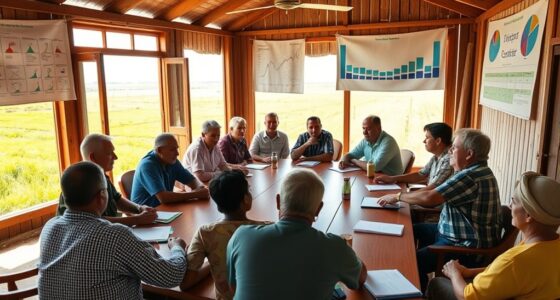The EU’s deforestation law requires coffee producers and importers to prove their products aren’t linked to illegal or harmful forest loss by 2025. You’ll need to trace your supply chain back to the farm level, collect detailed land use data, and affirm compliance through verification and certification schemes. This law pushes for greater transparency and sustainability, affecting how you source and sell coffee. Keeping up means understanding these changes and what they mean for your business’s future.
Key Takeaways
- EUDR mandates coffee companies to verify their supply chains are free from illegal or forest-damaging practices by 2025.
- Companies must trace coffee origins, collect detailed land use data, and ensure compliance with sustainability criteria.
- Verification involves audits, third-party inspections, and certification to demonstrate responsible sourcing.
- Certified coffee under schemes like Rainforest Alliance or Fair Trade helps meet EUDR requirements and boosts market appeal.
- Non-compliance risks market access, legal penalties, and damage to brand reputation, emphasizing transparency and sustainable practices.

Ever wondered how the European Union is tackling deforestation and ensuring responsible supply chains? The EU’s new deforestation law, known as EUDR, aims to curb the global loss of forests by requiring companies to verify that the products they sell are not linked to illegal or damaging deforestation activities. If you’re involved in the coffee industry, this regulation means you’ll need to pay close attention to supply chain transparency and certification impacts. The law mandates that companies must demonstrate, with verifiable evidence, that their coffee imports haven’t contributed to deforestation or forest degradation. This transparency isn’t just about ethical responsibility; it’s about complying with regulations that could impact your market access within the EU.
Supply chain transparency becomes a critical element under EUDR. You’ll need to trace the journey of your coffee beans from farm to shelf, pinpointing the origins and ensuring they meet strict sustainability criteria. This might involve collecting detailed data on land use, farming practices, and sourcing regions. The law encourages companies to adopt traceability systems that provide clear, reliable visibility into every stage of the supply chain. Doing so not only helps you meet legal requirements but also builds consumer trust, as more buyers demand ethically sourced products. Transparency also means you’ll need to be prepared for audits and verification processes, which could involve third-party inspections or certification bodies to validate your supply chain claims.
Trace your coffee’s journey from farm to shelf to meet EU sustainability standards and build consumer trust.
Certification impacts are significant under the EUDR. Certification schemes—such as Rainforest Alliance, Fair Trade, or Organic—can serve as valuable tools to demonstrate compliance. When your coffee is certified, it signals to regulators and consumers alike that your product adheres to recognized sustainability standards. However, not all certifications are equal, and the law is likely to scrutinize the credibility and scope of each scheme. Achieving a reputable certification can make it easier to meet due diligence requirements, but it also means you’ll need to maintain those standards consistently. The impacts of certification extend beyond legal compliance; they influence your brand image and market positioning. Certified coffee often fetches higher prices and appeals to eco-conscious consumers, giving you a competitive edge in a rapidly evolving market.
In essence, EUDR compels you to take responsibility for your supply chain and prioritize transparency. It encourages investments in traceability technology and sustainable certification, which can bolster your reputation and ensure continued access to the EU market. By understanding these shifts and proactively adapting, you not only comply with the law but also contribute to global efforts to protect forests, aligning your business with a more sustainable future. Incorporating natural materials and rustic decor elements into your processes can further align your business with eco-friendly practices.
Frequently Asked Questions
How Will EUDR Affect Small-Scale Coffee Farmers?
You’ll face new certification challenges under EUDR, which aims to prevent deforestation. Small-scale farming might become more complicated as you need to prove your practices are sustainable and comply with regulations. While the law encourages responsible farming, it may increase costs and paperwork for small farmers like you, potentially impacting your ability to access European markets. Staying informed and seeking support can help you navigate these upcoming regulatory changes.
What Penalties Exist for Non-Compliance With EUDR?
If you don’t comply with the EUDR, penalty enforcement can lead to hefty fines and restrictions on your coffee exports. Non-compliance increases your compliance costs and risks damaging your reputation. Authorities actively monitor and enforce penalties, so it’s essential to adhere to regulations. Staying compliant helps you avoid legal issues, maintain market access, and guarantee your coffee business thrives under the new law.
Will EUDR Impact Coffee Prices in European Markets?
Like steering a stormy sea, you’ll find EUDR’s impact on coffee prices could cause market volatility. As import tariffs and compliance costs rise, prices in European markets might surge, making your coffee more expensive. You’ll need to stay alert to shifting regulations and market dynamics, because these factors could drive prices up or down, depending on how smoothly supply chains adapt to the new deforestation rules.
How Can Exporters Ensure Compliance With EUDR?
To guarantee compliance with EUDR, you should strengthen your supply chain management by implementing robust traceability systems. These systems help you verify the origin of your coffee, ensuring it doesn’t come from deforested areas. Regularly audit your suppliers, request transparent documentation, and stay updated on EUDR regulations. Building strong communication channels with your partners will also help you adapt quickly and meet legal requirements efficiently.
What Support Is Available for Farmers Adapting to New Regulations?
You can access support through financial incentives and technical assistance programs designed for farmers like you. These initiatives help you implement sustainable practices that meet new regulations, reducing costs and improving productivity. Local governments and industry groups often offer training, resources, and funding to help you adapt smoothly. Take advantage of these opportunities to stay compliant, protect your land, and ensure your coffee farm’s long-term success.
Conclusion
By 2025, the EU’s Deforestation Regulation aims to markedly reduce the environmental impact of coffee imports, pushing producers toward sustainable practices. Did you know that coffee accounts for about 2% of global deforestation? This law could save millions of hectares of forest, helping preserve biodiversity and combat climate change. As a consumer, you’ll play a key role in supporting responsible sourcing—making your choice for eco-friendly coffee a powerful step toward a greener future.










